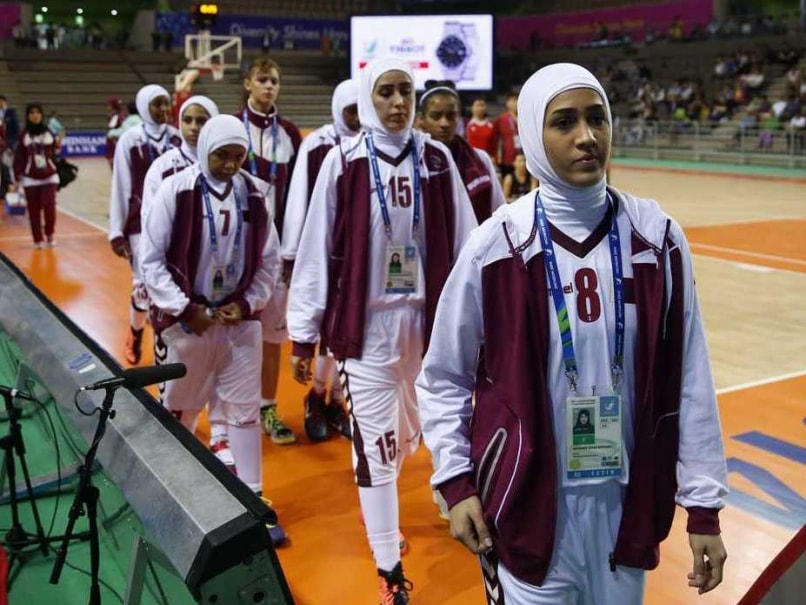Controversies at the Asian Games: Bans, Drugs and Deals
In less than a week, the 2014 edition of the Asian Games has seen it all - doping cases, controversies have marred the joy of winning and sorrow of loss.
- Written by Press Trust of India
- Updated: September 26, 2014 12:29 pm IST

Qatar's women's basketball team slammed a ban on their Muslim headscarves as an "insult" as a doping case and football match-fixing claims also rocked the Asian Games.
The furious Qataris pulled out of a second game and looked set to quit the basketball tournament altogether over a rule forbidding headwear in international games.
"This is an insult to us, they did not respect our religion," Qatar forward Refaa Morjan Mohammed told AFP.
In further controversies, the Olympic-style tournament in Incheon, South Korea, was hit by its second doping case after a Cambodian soft tennis player tested positive.
And a betting analysis company voiced strong suspicions that certain group games in the men's football had been rigged, citing unusual wagering patterns.
The incidents overshadowed a busy day six highlighted by South Korean swimmer Park Tae-Hwan's third failure to win a title, and another gold rush for China.
Qatar's women refused to attend the stadium for Thursday's game with Nepal, a day after they walked on court to face Mongolia but quickly departed when told they could not play.
Basketball body FIBA's ban on headwear in international competition is motivated by safety but it has raised hackles at Asia's Olympics, which includes several Muslim nations.
The Olympic Council of Asia (OCA), which runs the quadrennial Asian Games, criticised FIBA. Other sports such as football allow religious headwear.
"Every athlete has the right to represent their country's flag without discrimination," OCA director general Husain Al-Musallam said.
Cambodian soft tennis player Yi Sophany, 18, became the second athlete caught in the doping net when she tested positive for the banned stimulant sibutramine.
She follows 20-year-old Tajik footballer Khurshed Beknazarov, who was kicked out for doping on Tuesday and has been provisionally banned by Asian football authorities.
And authorities launched an investigation after betting analysis company Sportradar said it "strongly" suspects match-fixing in the men's football.
"We can say that we strongly believe there have been manipulated matches at the Asian Games," Andreas Krannich, managing director of strategy and integrity, told The New Paper in Singapore.
Krannich did not reveal the teams involved but said attention was focusing on at least one group game where late goals were scored.
"The odds, movements and the deviations caused alerts, belying clear betting evidence that could never be justified in a regular contest," he said.
The OCA said it would work with the Asian Football Confederation and world body FIFA to investigate the claim.
"OCA takes this matter seriously and works with the Asian federation and international federation (FIFA) for a proper and full investigation," an official told AFP.
In the pool, China's Ning Zetao showed no mercy to Park, deepening his suffering in an arena that bears his name with an Asian-record 47.70 sec in the men's 100 metres freestyle.
"I'm very excited with my gold medals," said Ning, who has overcome a bone infection in his knee. "They are very important to me and to the team. I broke the Asian record and I broke 48 seconds, which is very pleasing."
Hong Kong's Sarah Lee Wai-tze won her second cycling gold in the women's keirin after a dramatic third-race decider against Chinese star Zhong Tianshi.
Kim Un-Ju burst into tears of joy on the podium after winning North Korea's fourth weightlifting gold with a world record 164kg clean and jerk in the women's 75kg.
And South Korea celebrated their first world record of the Games when their women's compound archery team scored 238 points out of a possible 240 in the quarter-finals.
It was the second world record of the day after China set new standards in taking gold in the men's 50m rifle prone team event.
Police also launched a search for a Nepalese sepak takraw player who disappeared from the athletes' village, suspecting he may seek to become an illegal immigrant.
